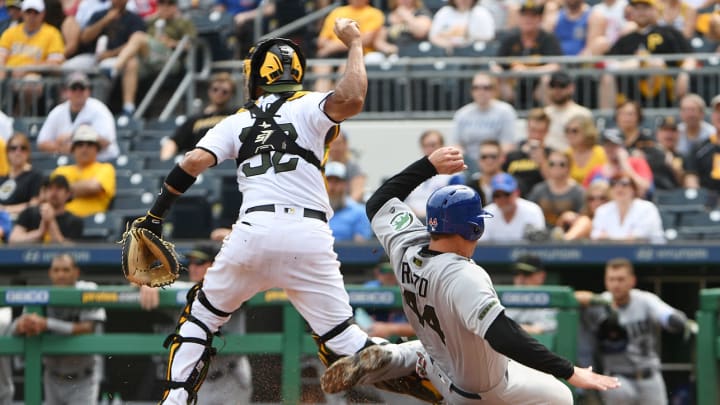OK, So Was That Anthony Rizzo Slide Dirty or Not?

The conversation around takeout slides has become so tired by this point that it might as well be scripted. Any criticism, no matter how valid or how reasonably presented it may be, is met with the same response: Slides like these are just baseball plays, and the one in question was definitely clean, and the fact that it’s even under discussion is proof that the game is going soft. Then comes a little talk about the potential for retaliation, which may or may not amount to anything. Even the most extreme examples of the genre—like Chase Utley breaking Ruben Tejada's leg in the 2015 NLDS, which came just a month after Chris Coghlan tore Jung Ho Kang's MCL with a similar slide and helped spur a new rule designed to protect fielders—haven't changed the debate much. The reaction to takeout slides as flagrant as those ones ultimately wasn't so different from the reaction to, say, Tyler Austin spiking Brock Holt last month. The specifics of the actual play tend to get lost, and the conversation moves back to the same limp argument about the validity of basic safety measures.
This week’s discourse has followed that precise script after Cubs first baseman Anthony Rizzo slid into Pirates catcher Elias Diaz on Monday. There is nothing fundamentally new in this discussion, but there was a notable piece of language used to hold it. Yesterday, MLB determined that the ruling on the field was incorrect—that Rizzo had, in fact, altered his path before making contact with the catcher, meaning the play should have been ruled interference. Later, Rizzo emphasized to reporters that while the league said his slide was illegal, they also told him that it wasn’t dirty. That distinction means little in practice; still, it’s a distinction that the league apparently chose to make. So what’s the difference between the two, and why should that difference even exist?
Rizzo said the league stressed to them they didn’t feel it was dirty, just illegal. Source says no further discipline. FYI
— Jesse Rogers (@JesseRogersESPN) May 29, 2018
Major League Baseball makes certain things illegal for the same reasons that any society does—typically, because those things are dirty. An act can be considered to be dirty because it causes harm (directly or indirectly, real or perceived), because it’s unfair, or because it makes everything a little messier. Most rules don’t have a foundation in some lofty moral goal. Instead, they’re founded on a desire for cleanliness and order. That’s the basic principle that gives us speed limits, and it’s the same one that gives us the infield fly rule.
Watch: Anthony Rizzo Slides Into Home, Clips Pirates Catcher Elias Diaz in the Leg
But “dirty” implies malicious intent. This carries pretty well here, though, because the rule on takeout slides in double-play situations has quite a lot to do with intent. Arguably, in fact, the rule has only to do with intent. From the rulebook:
If a runner does not engage in a bona fide slide, and initiates (or attempts to make) contact with the fielder for the purpose of breaking up a double play, he should be called for interference under this Rule 6.01.
This rule is the sole spot in the hundred-plus pages of the Official Baseball Rules where the term “bona fide” is used. It’s a squishy word, one that’s hard to define in explicit terms and not well-suited for a rulebook, but the section includes a set of hard-and-fast criteria by way of explanation. For a slide attempt to be considered “bona fide,” the runner must begin his slide before he reaches the base, he must be able to reach the base and then stay there, and he cannot alter his pathway to make contact. Even with that objective checklist, though, to use bona fide to describe a slide is still to make the whole thing a question of faith. (Literally.) So, yes, the rules state that an illegal slide is one where the runner starts in too late or goes out of his way to collide with the fielder, but, really, what all that means—in the language introduced by the rulebook itself—is that an illegal slide is just one made in bad faith. An illegal slide is, by definition, a dirty one.
"It was a good baseball play," Cubs manager Joe Maddon told reporters yesterday, after speaking about the slide with MLB Chief Baseball Officer Joe Torre. "It was interpreted the next day as being wrong, which I totally find incongruent.”
But the question here is never quite one of good and bad, nor is it one of wrong and right. The rulebook doesn’t care about how many runs the play in question is worth, and it doesn’t bother to ascribe any moral value to it. The rulebook just wants to keep things orderly here, to make sure that everyone’s buckled in and stopping at red lights, and so it cares only if the play is dirty—which is exactly what makes it illegal.

Emma Baccellieri is a staff writer who focuses on baseball and women's sports for Sports Illustrated. She previously wrote for Baseball Prospectus and Deadspin, and has appeared on BBC News, PBS NewsHour and MLB Network. Baccellieri has been honored with multiple awards from the Society of American Baseball Research, including the SABR Analytics Conference Research Award in historical analysis (2022), McFarland-SABR Baseball Research Award (2020) and SABR Analytics Conference Research Award in contemporary commentary (2018). A graduate from Duke University, she’s also a member of the Baseball Writers Association of America.
Follow emmabaccellieri